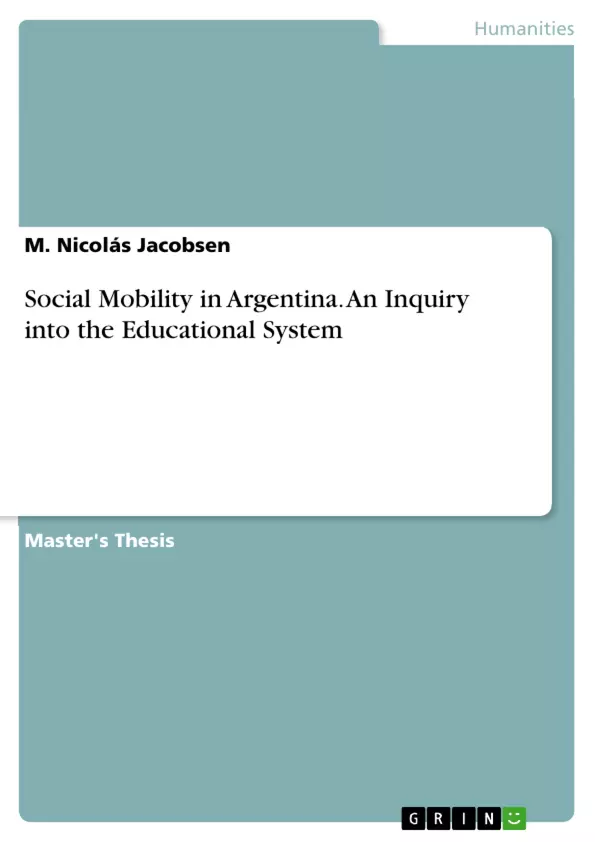The purpose of this thesis has been to investigate the role of the Argentinean Educational System and its relation with the degree of social mobility in the country. Considering on one side, that education is free for everyone in Argentina, but on the other side, that the levels of attainment of higher education are so low, this thesis aims to explore the role of education, and more specific the functioning of the Educational System in order to highlight its impact on the degree of social mobility. Furthermore, the thesis analyzes the consequences of the observed levels of poverty and inequality, as well as how the pedagogies implemented in the Educational System affect its outcome.
The thesis examines the socioeconomic and sociopolitical historical events that have influenced on the structure and the functioning of the Educational System, as well as the current situation of the country and the future perspectives. Moreover, the thesis analyzes the determinant factors that have influenced in the decision of a small number of people regarding higher education. Analyzing these aspects, the thesis highlights to which extent the Educational System is reproducing the same social structure or it is able to change that, avoiding the perpetuation of poverty and inequality.
The theoretical framework founded on Bourdieu’s theory of social reproduction, and its main concepts of habitus, field, capitals, and symbolic violence, made possible to analyze both the structure and the functioning of the Educational System on one side, and the individuals’ motivation toward higher education on the other side, providing a comprehensive picture of how the ES, the individuals’ background, and the interaction between them determine the degree of social mobility.
The thesis arrives to the conclusion that the Educational System plays a very relevant role on the degree of social mobility, and that the socioeconomic and sociopolitical contexts can conceal or exhibit the truth behind the common perception about that role.
Inhaltsverzeichnis (Table of Contents)
- Section 1 Introduction to the Thesis
- Introduction
- Problem Formulation
- Aim of the Thesis
- Section 2- Methodological Approach
- Structure of the Project
- Choice of Topic
- Research Design
- Methods
- Sources
- Theoretical Choice
- Limitations and Scope
- Definition of Key Concepts
- Section 3 - Theoretical Frame
- Introduction
- The concept of Habitus
- The concept of Field
- Different concepts of Capital
- Theoretical Reflection
- Section 4-Analysis
- Contextual Background
- General Introduction to the Country
- History of Education in Argentina
- The Educational System & Social Mobility
- The Periods of Social Mobility
Zielsetzung und Themenschwerpunkte (Objectives and Key Themes)
This thesis aims to investigate the role of the Argentinean Educational System and its relation to the degree of social mobility in the country. It analyzes the functioning of the Educational System, its impact on social mobility, and the consequences of poverty and inequality. It further explores how pedagogies implemented in the system affect its outcome.
- The influence of socioeconomic and sociopolitical events on the structure and functioning of the Educational System.
- The impact of the Educational System on social mobility in Argentina.
- The role of poverty and inequality in shaping the Educational System and social mobility.
- The influence of different pedagogies on the outcomes of the Educational System.
- The extent to which the Educational System either reproduces or changes the existing social structure.
Zusammenfassung der Kapitel (Chapter Summaries)
Chapter 1 introduces the thesis, outlining the problem formulation, aim, and objectives. Chapter 2 describes the methodological approach, including the research design, methods, sources, and theoretical choice. Chapter 3 presents the theoretical framework based on Bourdieu's theory of social reproduction, introducing the concepts of habitus, field, capital, and symbolic violence. Chapter 4 delves into the contextual background, providing a general introduction to Argentina and its educational history. It also analyzes the Educational System's relationship to social mobility and the periods of social mobility in Argentina.
Schlüsselwörter (Keywords)
The key concepts and themes explored in this thesis include: Habitus, Different Capitals, Field, Symbolic Violence, Education, Educational System, Social Mobility, Poverty, Inequality, and Pedagogies. The thesis uses Bourdieu's theory of social reproduction as its theoretical framework to analyze the structure and functioning of the Argentinean Educational System and its impact on social mobility within the context of the country's socioeconomic and sociopolitical history.
Frequently Asked Questions
What is the main focus of this thesis on Argentina?
The thesis investigates the relationship between the Argentinean Educational System and social mobility, specifically why higher education attainment remains low despite being free.
Which theoretical framework is applied in the study?
The study is based on Pierre Bourdieu’s theory of social reproduction, utilizing concepts like habitus, field, capital, and symbolic violence.
Does the Argentinean educational system promote social mobility?
The thesis concludes that the educational system plays a relevant role, but often reproduces existing social structures rather than changing them, due to socioeconomic contexts.
How do poverty and inequality affect education in Argentina?
The research explores how these factors influence individual motivation and the overall functioning of the educational system, often perpetuating social disparities.
What are the key keywords of this research?
Key terms include Habitus, Social Mobility, Bourdieu, Educational System, Argentina, Poverty, and Symbolic Violence.
- Quote paper
- M. Nicolás Jacobsen (Author), 2015, Social Mobility in Argentina. An Inquiry into the Educational System, Munich, GRIN Verlag, https://www.grin.com/document/375718



